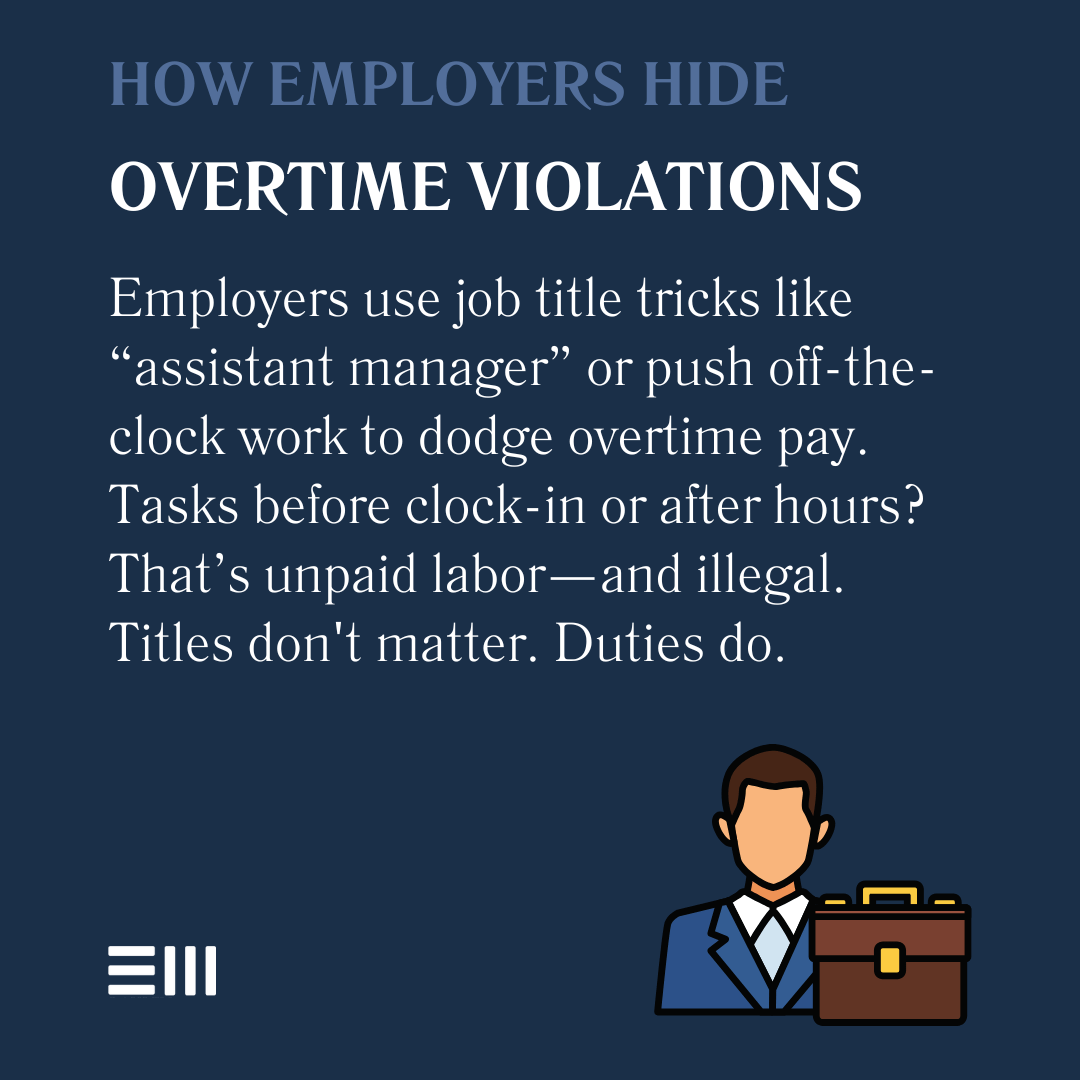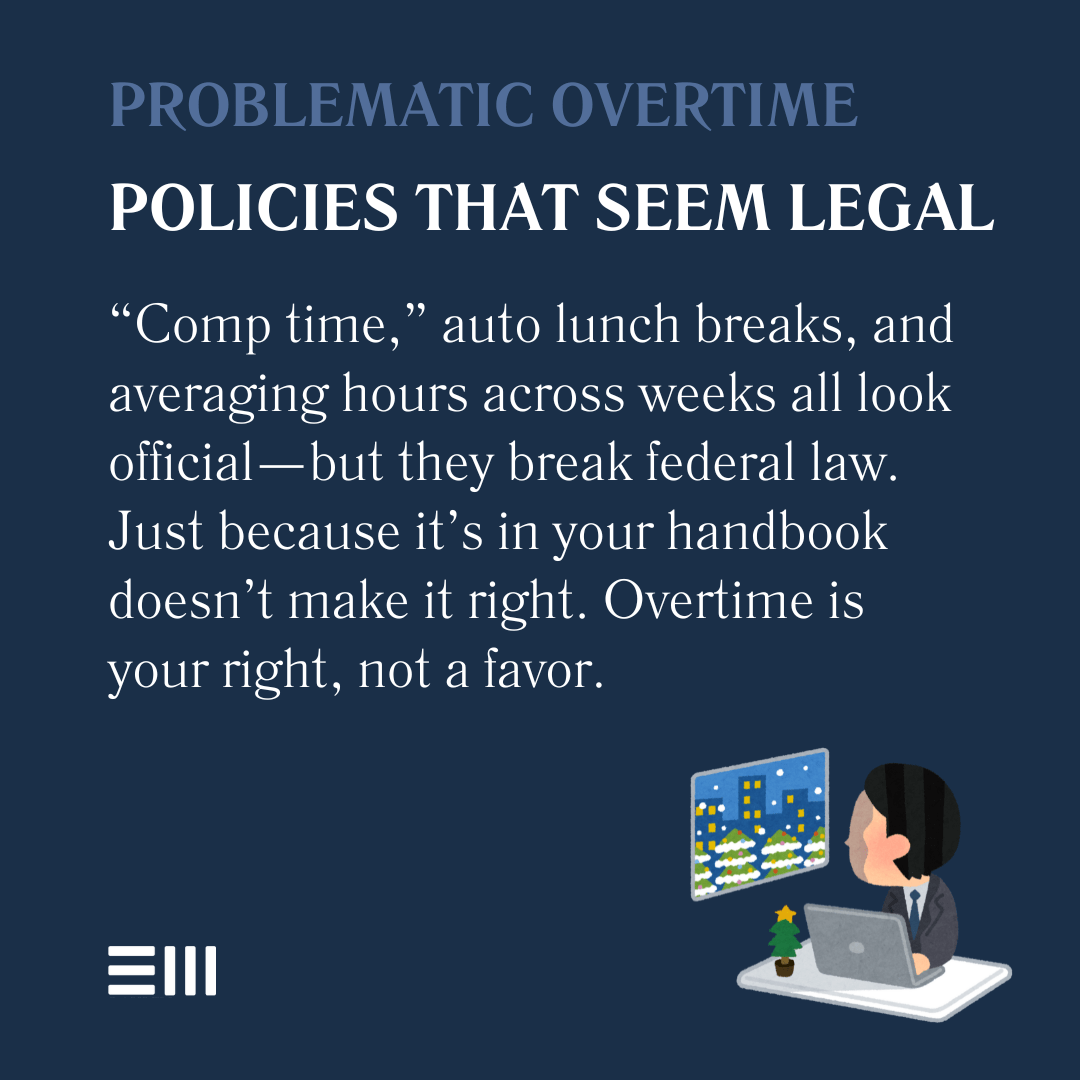Every year in America, employers steal an estimated $15 billion from workers' paychecks through overtime violations—more than the value of all property crimes combined.
In Alabama alone, thousands of employees work extra hours without receiving the time-and-a-half pay legally owed to them, often unaware their rights are being systematically violated through sophisticated tactics designed to look legitimate on the surface.
Common Methods Employers Use to Avoid Overtime Pay
Employers across Alabama and beyond have developed numerous strategies to circumvent overtime requirements while maintaining a veneer of legal compliance. Understanding these tactics helps employees recognize when their rights to fair compensation are being violated.
Many companies deliberately misclassify employees as exempt from overtime requirements by incorrectly categorizing them as executive, administrative, or professional employees.
This misclassification allows employers to demand unlimited hours without paying overtime premiums, despite the fact that many of these workers perform duties that clearly qualify them for overtime protection under federal and Alabama labor laws.
Another prevalent tactic involves manipulating job titles to suggest exempt status without changing actual job duties. Employers might assign titles like "assistant manager" or "team lead" to employees who spend the vast majority of their time performing the same non-exempt duties as their coworkers.
The title change creates the illusion of an exempt position while actual job responsibilities remain primarily non-managerial or non-administrative in nature.
Some employers pressure employees to work "off the clock" through various means, including suggesting that certain tasks must be completed outside regular hours, requesting employees arrive early or stay late without recording the time, or creating workplace cultures where checking emails and finishing tasks after hours becomes an unwritten expectation.
These practices directly violate overtime laws but often go unreported due to workplace pressure and fear of retaliation.
Illegal Overtime Policies That Appear Legitimate
Beyond obvious violations, many Alabama employers implement policies that appear compliant on the surface but actually violate overtime laws in more subtle ways. These practices often go unchallenged because they seem official or standard.
Problematic overtime policies include:
- "Comp time" arrangements in private sector jobs that substitute future time off instead of paying overtime;
- Averaging hours across multiple weeks to avoid overtime thresholds;
- Automatic meal break deductions regardless of whether employees actually take breaks;
- Requiring overtime approval but still accepting the benefits of unapproved overtime work;
- Setting artificially low time estimates for tasks that cannot reasonably be completed within allotted hours;
- Paying "half time" rather than time-and-a-half for certain overtime situations; and
- Separate payroll systems or "ghost companies" that hide combined hours worked across related entities.
These policies often come with official-sounding names and explanations that make them appear legitimate to employees who lack specialized knowledge of overtime laws.
However, the Fair Labor Standards Act and Alabama state regulations prohibit these practices regardless of how they're presented or whether employees have "agreed" to them.
Industries With Highest Overtime Violations in Alabama
While overtime violations occur across all sectors, certain industries in Alabama show particularly high rates of noncompliance with overtime laws. Understanding industry-specific patterns helps employees recognize when they might be vulnerable to overtime abuse.
Industries with frequent overtime violations include:
- Construction and contracting companies that misclassify workers as independent contractors;
- Healthcare facilities requiring "mandatory overtime" without proper compensation;
- Restaurants and food service operations with tipped employees working multiple positions;
- Retail establishments using assistant manager titles for primarily non-exempt work;
- Manufacturing plants implementing illegal averaging systems across pay periods;
- Call centers with unpaid pre-shift and post-shift activities;
- Transportation companies misapplying driver exemptions to non-driving personnel;
- Hotels and hospitality businesses with off-the-clock cleaning and preparation time;
- Agricultural operations incorrectly applying agricultural exemptions to processing activities; and
- Security firms with unpaid "on-call" time between active assignments.
Each industry has developed specialized tactics tailored to its specific workforce and operational needs. Employees in these sectors should pay particular attention to how their hours are tracked and compensated, especially when working beyond 40 hours in a workweek.
Warning Signs Your Employer Is Violating Overtime Laws
Recognizing potential overtime violations requires attention to certain warning signs that suggest an employer may be systematically avoiding proper overtime payments. Being alert to these indicators helps employees identify when they should investigate their compensation more closely.
Watch for these red flags:
- Paychecks that never seem to include overtime despite regularly working extra hours;
- Being told you're "exempt" without clear explanation of which exemption applies;
- Job descriptions that emphasize "manager" duties when actual work involves little management;
- Pressure to underreport hours or "volunteer" time to complete assignments;
- Policies against recording overtime but expectations to finish work regardless of hours needed;
- Different hourly rates applied to regular hours versus overtime hours;
- Required work activities before clocking in or after clocking out;
- Being told certain activities "don't count" toward work time (like training or preparation);
- "Unofficial" work communication after hours through personal devices or channels; and
- Paycheck hours that consistently match exactly 40 hours despite variable schedules.
When these warning signs appear, employees should document their actual hours worked and compare them to hours paid to identify potential discrepancies that might indicate overtime violations.
Frequently Asked Questions About Overtime Violations in Alabama
Workers dealing with potential overtime violations often have specific questions about their rights and options.
The following answers address common concerns about overtime compensation in Alabama.
Does Being Paid a Salary Mean I'm Not Entitled to Overtime?
Salary payment alone never determines overtime eligibility. Many salaried employees in Alabama remain entitled to overtime pay when working over 40 hours weekly. Overtime exemption depends primarily on job duties, not payment method.
Only employees performing specific executive, administrative, professional, computer, or outside sales duties as defined by federal regulations may be properly classified as exempt. Simply receiving a consistent paycheck labeled as "salary" does not remove overtime rights when performing non-exempt work.
What if I Signed an Agreement Waiving Overtime Rights?
Employers and employees cannot legally agree to waive overtime requirements. Any document, policy, or agreement purporting to eliminate overtime rights is invalid and unenforceable under both federal and Alabama law.
Overtime rights are established by statute and cannot be signed away. Courts consistently reject employer defenses based on employee agreements or consent to overtime violations. Your right to overtime compensation exists regardless of any paperwork you may have signed suggesting otherwise.
How Far Back Can I Claim Unpaid Overtime?
In Alabama, employees can typically recover unpaid overtime for the previous two years under standard claims, extended to three years when violations are proven willful. This lookback period applies from the date legal action begins, not when employment ends.
Detailed documentation of hours worked enhances recovery potential, though courts may permit reasonable estimates when employer records are inadequate. Employees should act promptly as each passing week potentially places older violations beyond recovery timeframes.
Reclaim Your Rightful Overtime Pay Today
Missing overtime pay isn't just an accounting error—it's money rightfully earned that directly impacts your ability to support yourself and your family. When employers deliberately use tactics to avoid paying overtime, they're not just bending rules; they're taking earned wages from your pocket.
Our experienced employment attorneys have helped countless Alabama workers recover unpaid overtime, often revealing systematic violations affecting multiple employees. We understand the sophisticated methods companies use to avoid overtime obligations and how to cut through misleading classifications and policies to establish your right to compensation.
Contact Baxley Maniscalco today for a confidential consultation about your overtime concerns.


